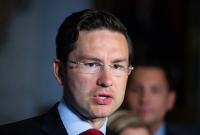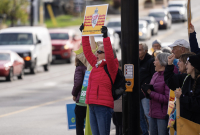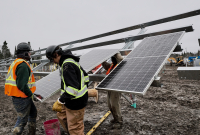Support strong Canadian climate journalism for 2025
A campaign mounted by several B.C. climate and civil society groups is calling on the provincial government to set more ambitious climate targets and enact policies to reach them.
For two years, an alliance of groups called the BC Climate Emergency Campaign has been calling for the provincial government to respond to 10 calls to action, including winding down fossil fuel production, restoring nature and setting climate targets based on science and justice. On Tuesday, several representatives of the campaign upped the demands.
“We are in deep doo-doo with respect to the climate crisis,” said Stewart Phillip, president of the Union of B.C. Indian Chiefs. “It absolutely astonishes me that in spite of clear evidence that we’re in the middle of the crisis of our time, governments continue to carry on business as usual.”
Member groups include the Union of B.C. Indian Chiefs, the Anglican Diocese of New Westminster, the Canadian Association of Physicians for the Environment, and more than 550 organizations have signed on to the campaign.
In 2021, the campaign released an open letter asking B.C. to ramp up its climate action plan, called CleanBC. As written, the CleanBC plan would not do enough to reduce the province's emissions of planet-warming gases, the campaign said. It also urged B.C. to phase out fossil fuel production and use, protect and restore nature, invest in zero-emission transportation and buildings and track and report its own progress.
That year, the CleanBC program won an award at the United Nations’ COP26 for its plan to use carbon taxes to reduce industrial emissions of climate-changing gases. It aimed to reduce emissions from oil and gas to 38 per cent of 2007 levels by 2030.
As a whole, the CleanBC program aims to reduce carbon emissions by 40 per cent by 2030 and reach net-zero carbon pollution by 2050. On Tuesday, the campaign announced the province has made “minor progress,” but it is not on track to meet its climate goals.
“We are in a climate emergency and we need to act as if we are in a climate emergency,” bishop of the Anglican Diocese of New Westminster John Stephens said. “This is the time to act. This is not the time to hesitate.”

Since the campaign first called B.C. to action, the province has approved a new liquefied natural gas facility, Cedar LNG. Canada’s largest LNG project, an export terminal in Kitimat, B.C., is set to be completed by 2025. Campaign members said the new projects will not help B.C. meet its targets.
“I cannot believe that we still have to say it,” said Peter McCartney, campaigner for the environmental group Wilderness Committee, “B.C. cannot build these new liquefied natural gas plants, expand fracking to build them and meet its climate commitments.”
On Tuesday, the campaign called for the province to phase out fossil fuels by banning gas-burning appliance hookups in new buildings — a policy shot down by Vancouver city council earlier this year.
Phillip said after the summer’s climate-driven extreme weather, he hoped governments would commit to stronger climate policies.
“I am very, very, very fearful of what’s to come, and the fact that we still don’t have governments that want to fully engage this catastrophic time that we’re in,” Phillip said.
Janelle Lapointe, a climate justice and Indigenous rights advocate from Stellat’en First Nation, Caribou Clan, acknowledged that B.C. has promised to protect 30 per cent of land by 2030 and create new marine conservation zones in partnership with Indigenous Peoples.
Still, Lapointe said the province’s action to protect and restore nature was “minor” as ancient trees continue to fall. Although the province promised to protect old-growth forests, environmental groups and First Nations continue to document logging in areas that have been identified as at-risk.
“In the time when we’re experiencing immense climate disasters, what could be more important than protecting these crucial ecosystems?” Lapointe said. “Ecosystems that are resilient to forest fires and that are cleaning the air for us to breathe, and are home to many species that we are at risk of losing forever.”






Comments
It appears only Quebec has a serious plan while the Conservative Premiers and Federal Leader of the Opposition actively attack any federal proposals while using populism and outright hostility and lies to bamboozle us. Uruguay a small landlocked country with a population a little less than Alberta just achieved creating an electric grid of 100 % renewable energy. Premier Smith says it must be fantasy.
Good article, but the BC government says the biggest source of GHG pollution is transportation, and that is barely mentioned. The transportation section of this report justifies a stand-alone article. The intro to point 8 is:
"Transportation is the largest source of greenhouse gas emissions in BC and emissions in this sector are rising.50 The Clean Transportation Action Plan will be released soon, and aims to reduce vehicle distance traveled 25% by 2030; shift to active transportation and transit; improve vehicle efficiency; and adopt zero-emission vehicles.
While BC made progress on electric vehicles, charging stations, and transit in 2023, highway expansion continues to induce increased traffic. A rapid mode shift is possible if we reallocate funding from highway expansion to public transit and active transportation within and between all communities." https://bcclimateemergency.ca/progress-report